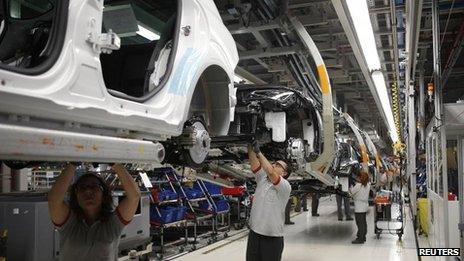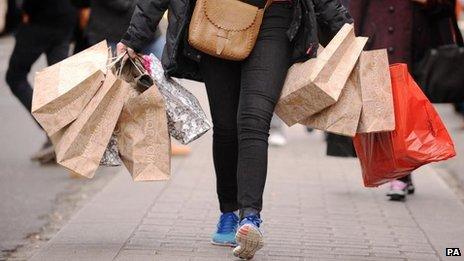How fragile is the 2014 recovery?
- Published
- comments

So, for the avoidance of doubt, I hate this time of year - largely because of the convention, in the media, in business, in the City, that it is time to take stock and make predictions for the coming year.
Is it that those extra glasses of festive vino are supposed to improve powers of foresight? Or is there some magic in Christmas and Hanukkah that means whatever I was thinking two weeks earlier about what's happening in the world is changed in some mystical way?
Bonkers.
Unfortunately it is the expected bonkers. So here goes.
First point.
The economic recovery we've witnessed in almost all the developed and big economies this autumn will continue through most of 2014, and in some cases - including the UK's - may gain momentum.
The "flows" in the global economy - temporarily at least - are not as strong a brake on growth as they were: the pace of tax rises and spending cuts has slowed almost everywhere; consumers are more confident, largely because there haven't been any truly hideous shocks for almost two years; and businesses are a bit more confident.
And, of course, central banks have continued to create free money and cheap credit as if there is no tomorrow - to offset the intractable reluctance of commercial banks and financial institutions to create credit.
Hey presto, this is the jolliest Yule for six years. And if you don't want to spoil the festive mood, stop reading now.

Western economies need shoppers in China to start spending more
Second point.
The big structural flaws in most economies, and the global economy, are not mended, so - unless this coming year's more benign economic conditions are exploited to accelerate the remediation - the recovery could very easily start to peter out towards the end of 2014.
Or to put it another way, the "stock" problem - excessive debts in Europe, Japan and (to a lesser extent) the US - is still with us. The lack of competitiveness of many western economies, the UK, France, even the US, has not been fixed.
And because of the endemic weakness of the richer economies, China remains dangerously dependent on mind-bogglingly excessive, debt-fuelled investment to generate the rapid growth perceived necessary by its government (and one January treat for you - ha ha - will be a film I've made for BBC2 on whether the Chinese economic miracle is about to expire).
To be clear, in a globalised world, we are all in this together. And the long-term sustainability of growth in both West and East would require two analogous changes: a greater willingness of Chinese people to consume, and an increased desire on our part to save, or cultural revolutions that would be the work of decades.
The way I see all this, as you know (you really do, or you haven't been paying attention), is that there is far too much debt in the world, and far too little equity, because
a) most rich economies have an extraordinary propensity to consume,
b) our banks, till recently, fed this consumption with the frenzied provision of credit,
c) we buy far more from the rest of the world than we sell to it, because our tradeable sector - especially in manufacturing - is too small.
On this view, America's much more rapid recovery than Europe's is no mystery: it is because the debts of American households have fallen fairly rapidly since the 2008 global calamity; and because the notorious or celebrated fracking has made America much less dependent on expensive imported energy.
Only France, with its vast nuclear generators, has relatively cheap energy within the EU.
Importantly, European banks and insurers are - generally - weak, not capable of supplying vital credit to households and businesses (this is less of a problem in the UK). And the putative solution, a comprehensive "asset quality review" by the European Central Bank over the coming year, may for a time make banks more risk averse and reluctant to lend, so as to minimise the amount of expensive capital they may be forced to raise to fix their historic imprudence.
Also, and to state the bleedin' obvious, European member states persist in maintaining the conceit that monetary union requires only very limited political and fiscal union.
So, for example, a recently announced plan to tackle the problem of banks that are too big to fail, an agreement on new rules for limiting the impact on taxpayers when they do fail, keeps all the residual burden of rescuing banks on the home country's exchequer. With no explicit sharing of costs and risks by eurozone countries, the finances of the weaker economies - Spain, Italy, inter alia - will remain dangerously stretched.
In those circumstances, of banks' viability in extremis resting on the questionable solvency of their home countries' governments, there is little prospect of banks in the weaker economies being able to borrow from markets cheaply or easily - in that the risks of banks' creditors losing money remain non-trivial.
That in turn means that the weaker banks will remain unhealthily hooked on cheap funding from the European Central Bank, and will continue to find it hard to finance any fledgling economic recovery.
Which I could have condensed by saying "plus ca change..."
Hey presto: Europe is still flatlining, and America is growing at 3% per annum, or maybe a bit more.
All of which creates something of a puzzle: why on earth is Britain growing at an almost identical pace to America, and pulling away from our confrere across the Channel?
Yes, household debts in the UK have fallen relative to income, though not in absolute terms, and they remain high (140% of available income, more than £1.5 trillion).
But, we don't have cheap energy (I didn't need to remind you of that, did I?).

PPI mis-selling payouts may well be behind the recent rise in consumer spending
Also the gap between what we sell to the rest of the world and what we buy from it has actually been widening. And business investment has increased only very slightly.
Or to put it another way, why are British consumers (is that you, by the way?) saving less and spending again?
I wrote a bit about all this recently.
But, silly me, I forgot quite an important stimulus - which has nothing to do with the Chancellor, or the Bank of England.
You might call it a leaving present from the now defunct Financial Services Authority, because it was the decision in April 2011 of the FSA's then chief executive Hector Sants to force the banks to pay restitution for mis-selling PPI credit insurance.
At the time the FSA estimated this would lead to the banks forking out "just" £4bn.
This was a wild under-estimate. It is now clear the banks will be handing more than £16bn to their customers, which represents a boost to consumers' balances of around 1% of GDP.
Since around three quarters of this PPI cash has been handed out over the past 18 months, this is probably the single biggest contributor to the revival of consumer spending.
The banks' sins of the past transformed into a current virtue, thanks to the intermediation of the regulator.
Wunderbar, surely.
It's coming to an end of course (although the spam texts and cold calls from the dratted claims firms would make you think otherwise).
Which is why it really matters that businesses, with their tails up a bit, become less risk averse and start investing.
As it happens, the business leaders to whom I chat are remarkably bullish right now. And although this is hideously unscientific and "intuitive", my sense is that there are some legs to this recovery, for all the drag of a lamentable trade performance.
So what's the biggest challenge or risk for 2014?
It is the probable phasing out of money and cheap-debt creation by the US and UK central banks (there is no chance of that happening in the eurozone).
Will the economies in the US and UK have achieved adequate lift-off velocity to withstand the choking off of the fuel of exceptional monetary stimulus?
Gawd only knows, because this is genuinely uncharted territory. If you pressed me, I would say I doubt it, but I could be wrong (as if you doubted that).